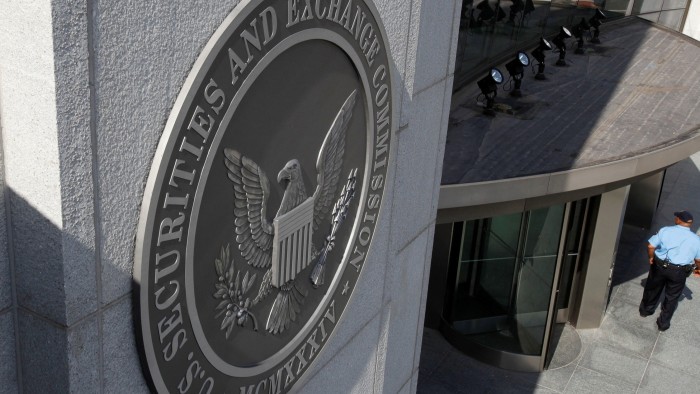Unlock the Editor’s Digest for free
Roula Khalaf, Editor of the FT, selects her favourite stories in this weekly newsletter.
The writer is a managing director at legal recruitment firm Major, Lindsey & Africa
Just days after Donald Trump’s return to the White House in January, a seasoned enforcement attorney at the Securities and Exchange Commission picked up the phone. “I’m ready to leave,” she told me, her voice edged with frustration.
For years, she had taken pride in holding Wall Street accountable. But now she felt like a lifeguard at a pool with no swimmers. Cases had slowed to a trickle. Deregulation, a hallmark of the administration’s agenda, eroded the sense of purpose that had anchored her career. Political pressure further complicated decision-making and investigations stalled. She wasn’t alone in feeling idle. “I didn’t sign up to sit on the sidelines,” one former senior member of staff confided in me.
Across the SEC, legal and compliance professionals are quietly making their exit. Beyond voluntary departures, internal restructuring is also pushing professionals out. The so-called Department of Government Efficiency (Doge) has incentivised resignations, is seeking to eliminate regional office leases, and cut senior positions.
The exodus is just beginning, but its impact on Wall Street could be profound. With the agency losing experienced enforcers, firms may believe they are facing a more lenient regulatory landscape. A shifting SEC does not, however, mean a disappearing SEC — those who misread this moment could find themselves dangerously exposed.
When seasoned regulators walk out the door, institutional memory disappears with them. The SEC is left with fewer experts who understand the nuances of enforcement. This makes it harder to launch new investigations, follow through on existing cases, or effectively deter misconduct. The agency’s ability to act as a credible check on financial malfeasance is being eroded just as markets adjust to a looser regulatory regime.
For firms, this changing SEC landscape presents both an opportunity and a risk. Some may see the lack of enforcement muscle as a green light to cut corners. But this is a dangerous gamble. The last time deregulation emboldened firms to take greater risks, it contributed to the financial crisis of 2008. Enforcement priorities may shift, but the pendulum always swings back. When it does, firms that have grown lax in their compliance culture could face severe consequences.
Even under a pro-deregulation administration, financial watchdogs aren’t disappearing. The SEC’s examination division remains active, as are state regulators such as the New York Department of Financial Services. Compliance obligations under global frameworks, such as anti-money laundering laws and disclosure requirements on environmental, social and governance issues, remain pressing concerns. Firms that take their foot off the gas now may find themselves unprepared when the tide inevitably shifts.
This is particularly evident in areas such as cryptocurrency oversight and private fund regulation. While federal regulators may be slowing down enforcement, state attorneys-general and international watchdogs are intensifying scrutiny. The push for more transparency in private equity fee structures hasn’t disappeared — it has simply moved to a different regulatory playing field. Similarly, while SEC oversight of digital assets may be waning, European and Asian regulators are tightening their grip.
With fewer regulators at the SEC, asset managers, banks and broker-dealers have an opportunity to bring that expertise in-house. Firms that invest in this talent now will gain a strategic advantage. Former SEC officials bring an inside understanding of how regulatory priorities shift and where enforcement efforts are likely to be focused. Their presence can enhance a firm’s compliance posture, provide credibility and bolster investor confidence.
For firms that take the long view, now is the time to double down on compliance rather than scale it back. Strengthening internal teams, conducting proactive risk assessments and maintaining a culture of integrity will set them apart.
The SEC exodus is not just a staffing issue; it’s a shift with lasting consequences for financial markets. While the erosion of enforcement capacity may lead to a more permissive business environment in the short term, it also raises the spectre of long-term instability. The question is not whether enforcement is disappearing, but how it is evolving. The smartest players will recognise that while regulatory tides change, the need for strong compliance never does.
As one former SEC official put it, “regulators may come and go but enforcement never really disappears. The firms that prepare today will be the ones that thrive tomorrow.”
